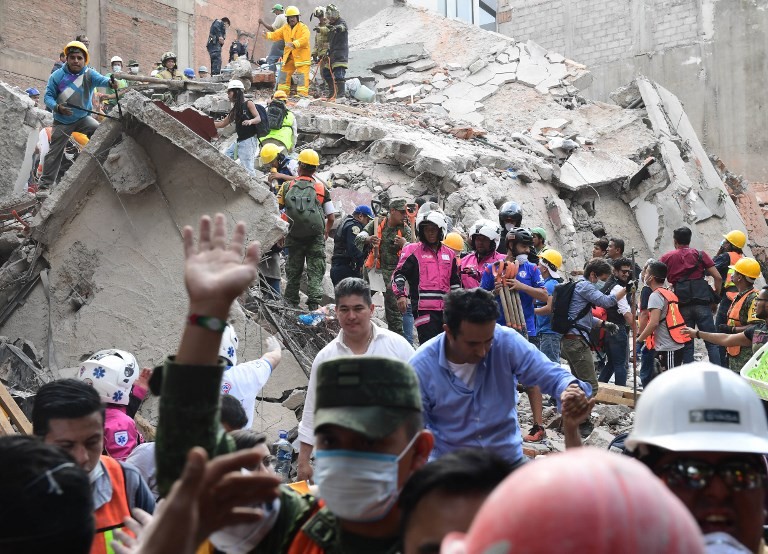P.S: The direct sentences are highlighted in green & the indirect sentences are below the article.
Nearly 140
killed in powerful Mexico quake
Nearly 140 people were killed when
a powerful, 7.1-magnitude earthquake struck Mexico on Tuesday, toppling
buildings in the capital and sowing panic on the anniversary of a devastating
1985 quake.
Rescue crews and volunteers in Mexico
City -- home to 20 million people -- clawed through the rubble of at least 49
collapsed buildings looking for survivors and bodies.
Local media reported that families were
getting Whatsapp messages pleading for help from desperate relatives trapped
under the debris.
Mexico City recorded 36 of the deaths,
while Morelos state directly south of it saw 64 killed. The others were
registered in Puebla (29), a town southeast of the capital, and in Mexico state
(nine), which lies just to the west of the capital.
National Coordinator for Civil
Protection Luis Felipe Puente said a total of at least 138 people died.
Memories of the devastating 1985
earthquake that killed 10,000 people in Mexico City spurred panic on Tuesday.
Many quickly ran for safety outdoors when walls around them swayed and cracked.
"I'm
so worried. I can't stop crying. It's the same nightmare as in 1985," Georgina
Sanchez, 52, sobbed to AFP in a plaza in the capital.
Amamia Sanchez, a 45-year-old secretary
cried out: "It's just not
possible that this happened also on September 19."
The quake -- which occurred in the
early afternoon, hours after city authorities had conducted an earthquake drill
-- caused damage in the bustling center of the city, and to areas south and
west of the capital.
"We
ran outside thinking all was going to collapse around us," said
Lazaro Frutis, a 45-year-old who escaped an office building before it crumbled
to the ground. "The worst
thing is, we don't know about our families or anything."
"It
was horrible," said resident Leiza Visaj Herrera, 27. "I didn't want to get close
under any tree. I had to hold on to the ground."
Scenes of chaos permeated the city
straight after the earth shuddered. Traffic jammed to a standstill before
blanked-out stop lights, and anxious people ran between vehicles as ambulances
tried to make headway, sirens squealing.
Emergency officials warned people in
the streets to avoid smoking because of the risk of igniting gas leaking from ruptured
pipes.
In several locations, people were seen
clambering on buildings that were now piles of stone and tangled metal to pull
people out.
Jorge Lopez, a 49-year-old Spaniard
living in Mexico City, said that he raced to the school in the central Roma
district where his children aged six and three were in class, to find it
collapsed but his offspring safe but terrified.
"We arrived at the school and
everyone was crying, everyone was frantic, and the kids were holding on to a
rope," he said.
"It's uncontrollable. You can't do
anything against nature."
Witnesses said another school was
smashed to rubble in Cuernavaca, a town just south of the capital. The fate of
the pupils and teachers was unknown.
An office building of around five
stories in the chic Condesa district of central Mexico City collapsed.
Volunteers scrambled among the debris, pulling out three survivors and looking
for more.
"There are people trapped
there!" yelled one woman.
Similar efforts were made at other
smashed buildings nearby. At one, an emergency worker held up a sign commanding
"Silence" so crews could listen for the sounds of any survivors.
Patients were evacuated from a hospital
in the adjoining Roma district, wheeled out on beds and wheelchairs as staff
set up makeshift wards outside.
President Enrique Pena Neto said on
Twitter he had ordered the evacuation of damaged hospitals "and the
transfer of their patients to other medical facilities."
At one collapsed building in the Roma
district, dozens of people dug through rubble as they waited for the arrival of
heavy machinery to move the massive chunks of stone. Officials called out for
more volunteers, and for water.
A woman standing and watching the
efforts with her husband, a doctor, turned to him and said, "Darling, if
you want to help, give me your glasses and take care."
The city's international airport closed
for more than three hours following the quake, and the stock market was forced
to shut down.
Hours after the quake, residents stood
around outside, in the streets, fearing aftershocks.
Direct Sentence to Indirect
Sentence
1. Direct: "I'm
so worried. I can't stop crying. It's the same nightmare as in 1985,"
Georgina Sanchez, 52.
Indirect: Georgina
Sanchez (52) said that she was so worried, She couldn’t stop crying and that it
was the same nightmare as in 1985.
2. Direct: Amamia
Sanchez, a 45-year-old secretary cried out: "It's just not possible that
this happened also on September 19."
Indirect: Amania
Sanchez (45) told that it was just not possible that it had happened also on
September 19.
3. Direct: "We
ran outside thinking all was going to collapse around us," said Lazaro
Frutis, a 45-year-old who escaped an office building before it crumbled to the
ground. "The worst thing is, we don't know about our families or
anything."
Indirect: Lazaro
Frutis (45) said that they had run outside thinking all was going to collapse
around them, and that the worst thing was they didn’t know about their families
or anything.
4. Direct: "It
was horrible," said resident Leiza Visaj Herrera, 27. "I didn't want
to get close under any tree. I had to hold on to the ground."
Indirect: Leiza
Visaj Herrera (27) said that it had been horrible, she had not wanted to get
close under any tree and that she had had to hold on to the ground.
Ismadanti, Margaretha, Rahmaluttifah, Stacia
4SA01
PBIBK





























